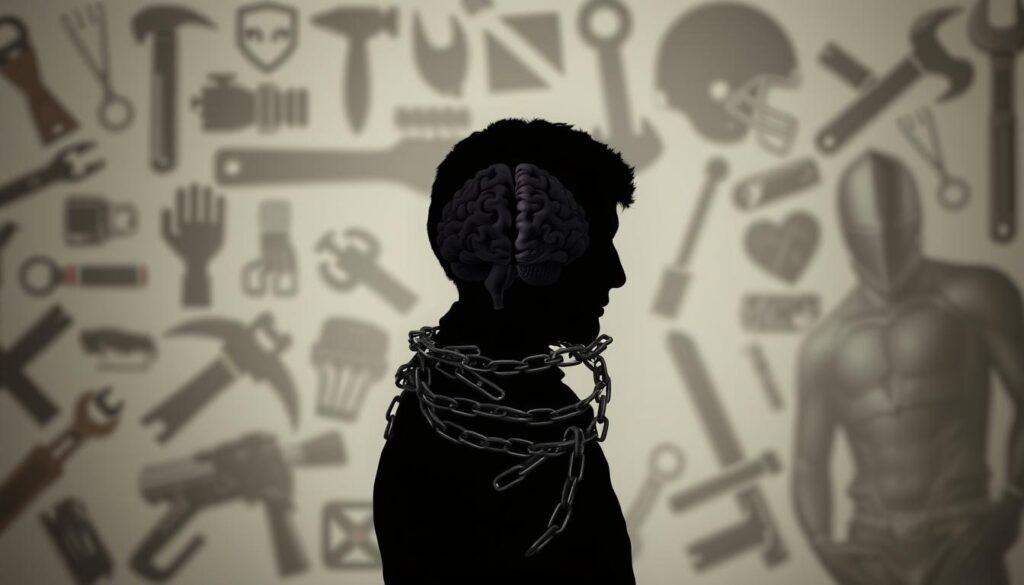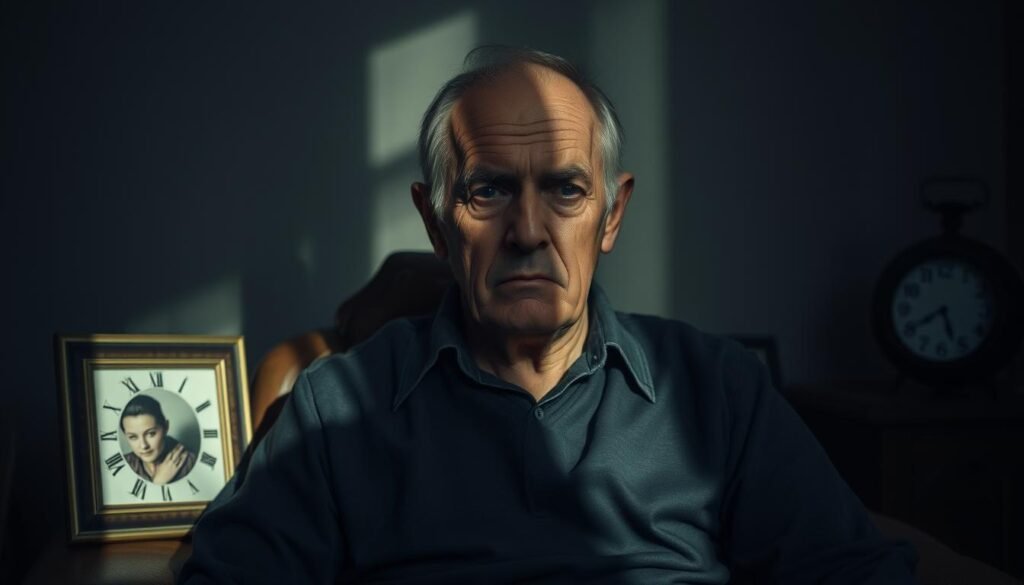It’s surprising, but men are four times more likely to take their own lives than women. This is despite the fact that women attempt suicide more often. This points to a big problem with men’s mental health: their battle with depression often goes unnoticed. Every year, over 6 million men in the United States battle with depression. But, many do not get diagnosed or treated. This article will talk about what makes male depression unique. It will look at its symptoms, what increases its risk, and how to treat it.
It’s important to understand the pressures society puts on men. These pressures can make the depression crisis worse. Many men try to cope by hiding how they feel or by using harmful ways to deal with it. Knowing the signs of depression in men is the first step. It can start helpful talks that lead to getting support and getting better.
Key Takeaways
- Male depression often presents differently than in women, influenced by biological and social factors.
- Many men exhibit reluctance to discuss their feelings, contributing to undiagnosed depression.
- Common symptoms include emotional distress, physical ailments, and escapist behaviors.
- Effective treatments for depression are available, emphasizing the importance of seeking professional help.
- Making positive lifestyle changes can significantly improve men’s emotional well-being.
Understanding Male Depression
Understanding male depression means seeing how it’s different from women’s depression. It’s a serious issue that can mess up someone’s daily life and relationships. Men often show signs like being irritable, aggressive, and not sharing their feelings. Knowing these signs is key to helping men feel better emotionally.
What is Male Depression?
Many things, like losing a job, feeling lonely, or chronic stress, can cause male depression. About 76% of men feel stressed once a week. Men might deal with it by playing too many video games or using drugs, unlike women who might feel sad. This condition includes types like seasonal affective disorder, psychotic depression, and persistent depressive disorder.
Common Symptoms of Male Depression
Male depression symptoms can show up as both physical and emotional problems:
- Loss of interest in previously enjoyed activities
- Aggression and mood swings
- Increased reliance on alcohol or drugs
- Sleep disturbances and chronic fatigue
- Feelings of hopelessness and worthlessness
- Suicidal thoughts and risk of self-harm
- Physical complaints, including persistent backaches or digestive issues
It’s important to understand these masculine depression symptoms for quick help. If not treated, male depression can lead to serious issues like suicide, especially in middle-aged white men. This underlines the urgent need for better understanding and support for men’s emotional health.
| Symptoms | Description |
|---|---|
| Loss of Interest | Diminished pleasure in activities once enjoyed. |
| Aggression | Increased irritability or anger, affecting relationships. |
| Substance Use | Escalated use of alcohol or drugs as coping mechanisms. |
| Sleep Issues | Sleeping problems or chronic fatigue impacting daily life. |
| Suicidal Thoughts | Increased contemplation of self-harm or suicide. |
| Physical Ailments | Frequent ailments like headaches, low libido, digestive issues. |
Why is Depression in Men Often Hidden?
Many men face depression but don’t talk about it. They feel pressured by how society says a man should act. Men are taught to be strong, which makes it hard for them to share their feelings. As a result, they often ignore or hide their depression.
Societal Expectations and Masculinity
Men feel they shouldn’t talk about their feelings because it might seem weak. This belief stops them from getting help for mental health issues. They act tough instead of showing their true emotions.
Stigma Surrounding Men’s Mental Health
The stigma about mental health makes men less likely to get help. Research shows that men take stigma harder than women do. They’re scared of being seen as weak if they admit they’re struggling.
Downplaying Symptoms and Denial
Men might hide their depression by acting out or taking risks. Denying their feelings can make things worse, sometimes leading to serious problems. Instead of talking about their sadness, they may show anger. Not facing these issues makes it harder for them to get the help they need.

| Statistic | Data |
|---|---|
| Men with depression in the U.S. annually | Over 6 million |
| Men’s suicide risk compared to women | 3-4 times likelier |
| Percentage of suicides by men | 75% to 80% |
| Successful treatment rate for depression | Over 80% |
| Likelihood of men to seek help | Less likely due to stigma |
Unique Symptoms of Depression in Men
Understanding men’s depression symptoms is key for quick help. While many know the general emotional signs, men show them differently. They might show physical signs or act out, showing a less seen side of male depression.
Physical Symptoms Versus Emotional Symptoms
Men often report physical symptoms alongside emotional struggles. Issues like chest tightness and headaches can be depression signs. 9% of U.S. men feel depressed or anxious daily, showing how common these signs are. Unlike emotional symptoms, physical ones are less noticed and often untreated, as men usually seek help for physical problems first.
Anger and Irritability as Indicators
Anger and irritability are key depression signs in men. They might pull away emotionally or become aggressive, hiding their true feelings. Instead of sadness, men might show agitation, which can lead to risky actions if ignored. These signs often mix into daily life, making it hard to spot depression in men.
Reckless Behavior and Substance Abuse
Some men try to deal with tough feelings by acting recklessly or using substances. Drinking more or taking risks are signs of their inner struggle. These actions make their depression worse and can harm their safety. The CDC says depression affects personal habits, so noticing these changes is important for help.
It’s crucial to spot these signs of male depression, as they greatly affect health and relationships. For help and information, exploring recommended books can offer insights and coping methods. Visit this resource for top books on dealing with depression.
Risk Factors Contributing to Male Depression
Understanding depression in aging men is key. It helps us know why some struggle more. Aging brings challenges like loneliness and changes in hormones. These tie closely to mental health issues in men.
Loneliness and Lack of Social Support
Loneliness can lead to depression in men. When social circles get smaller, men might feel alone. This makes it tough to find help or connect.
Having good friends and a community helps. It reduces the feeling of being alone.
Aging and Depression in Older Men
Getting older brings physical and emotional issues. These can lead to depression. The loss of close ones adds to the feeling of sadness.
Understanding and seeking support is crucial. If faced with these emotions, resources like mental health guides can be helpful.
Midlife Crisis and Male Hormonal Imbalances
A midlife crisis often shakes up a man’s world. It can cause shifts in hormones. These shifts impact mood and well-being.
Recognizing this and getting help is important. Options include therapy, lifestyle changes, or groups. Taking action can make life better.

Recognizing Signs of Depression in Men
It’s hard to spot depression in men because many think it’s just feeling sad. Men might show different, less noticeable signs. We need to understand male mental health better and see past the common misconceptions.
Common Misconceptions about Male Depression Symptoms
Many think depression only shows up as crying or looking sad. This belief suggests men, who often act differently, aren’t as affected. But that’s not true. One in ten men will face depression or anxiety. Sadly, only half get help.
Men may seem irritable, restless, or very tired instead of just sad. These lesser-seen signs are important too. By changing how we see male behavior, we can better understand and help with their mental health issues.
How to Identify Stealth Symptoms
Some men hide their depression through anger or taking risks instead of showing sadness. Watch for changes in eating or weight. These could be signs someone is struggling.
Hard times like losing a job or going through trauma might bring out these symptoms. Talking more about mental health can help. Websites like NIMH offer great info. They help us support men in dealing with depression.

Impact of Depression in Men on Relationships
Depression doesn’t just impact the person suffering from it. It also affects their relationships with others. Men may show different signs of mental health challenges. These can affect partnerships, friendships, and family life. It’s key to use open communication, education, and supportive networks to manage these issues.
Effects on Spousal and Partner Relationships
Depression can make romantic relationships hard. Symptoms like being irritable and pulling away emotionally can make a partner feel left out and unloved. Here’s how:
- Decline in intimacy: A lower sex drive due to depression can reduce closeness.
- Withdrawal: Men might spend more time alone, making their partners feel lonely.
- Negative behavior: Angry outbursts and criticism can lead to fights and stress.
The Role of Friends and Family
Friends and family also play a big part in supporting men with mental health issues. Their efforts to understand and stay involved can help a lot. Here are important things to remember:
- Importance of social contact: Hanging out regularly can help ease depression symptoms.
- Communication: Talking openly helps with creating understanding and empathy.
- Encouraging support: Loved ones can recommend professional help and encourage taking care of oneself.
Depression in men has wide-reaching effects beyond the individual. Recognizing and dealing with these effects is crucial. It leads to healthier relationships built on support and good communication. This foundation aids in healing.
Effective Treatments for Male Depression
Helping men with depression improves their lives dramatically. They benefit from professional advice, therapy, and self-help methods. Knowing the help options lets men take steps to get better.
Professional Help and Therapy Options
Often, men wait too long before seeking treatment for depression. This delay can worsen their condition. Early action is key. Getting professional help usually involves different therapies, like cognitive-behavioral therapy. This method helps tackle mental problems effectively.
Men might hesitate to try therapy because it’s new to them. Encouraging them to see a doctor can lead to helpful treatments, including medication if needed. For those with deep depression, inpatient or outpatient services offer structured aid. They are designed to fit each person’s situation. Also, transcranial magnetic stimulation (TMS) is an option when other treatments don’t work.
Self-Help Strategies and Lifestyle Changes
Self-help methods are essential alongside professional help. Exercises raise mood and energy, helping fight male depression. Eating well, making friends, and being open with feelings improve mental health. Support from loved ones is key; it motivates men to get professional care.
| Treatment Type | Description | Effectiveness |
|---|---|---|
| Talk Therapy | Commonly used to explore emotions and coping mechanisms. | High in promoting understanding of personal issues. |
| Medication | Includes SSRIs and SNRIs to adjust brain chemistry. | Effective, especially in severe cases. |
| Transcranial Magnetic Stimulation (TMS) | Non-invasive procedure used for treatment-resistant depression. | Very effective for some individuals. |
| Inpatient Services | 24-hour care for severe symptoms. | Critical for immediate stabilization. |
| Outpatient Services | Regular therapy sessions while allowing home life. | Valuable for ongoing support. |
Knowing about these treatments gives hope to men with depression. Their recovery path is brighter with support from friends and family.
Awareness and Education about Men’s Mental Health
It is vital to increase awareness about men’s mental health. This helps in recognizing and treating conditions like depression in men. Teaching about mental health matters can improve understanding and reactions to men’s issues.
When communities show strong support, men feel safer sharing their feelings. This is key in helping them deal with emotional challenges.
Importance of Open Conversations
Talking openly about emotions helps lessen the stigma around men’s mental health. It lets men share their feelings without fear. A culture of openness means families and friends can aid men in seeking help.
This openness makes it easier for men to acknowledge their emotional difficulties. It’s a step forward in dealing with depression and anxiety.
Encouraging Men to Seek Help
Studies reveal a worrying trend: men often avoid seeking mental health assistance. Each year, over six million men suffer from depression without proper diagnosis. Stigma around seeking help needs to be dismantled.
Encouraging men to seek help, join support groups, or try therapy is crucial. Self-care, like exercising, practicing mindfulness, and getting enough sleep, also enhances mental health.
| Year | Men Meeting Criteria for MDD (%) | Women Meeting Criteria for MDD (%) |
|---|---|---|
| 1991-1992 | 2.74 | 4.88 |
| 2001-2002 | 4.9 | 8.6 |
Conclusion
Depression in men is a serious problem that’s often hidden. This leads to misunderstandings about the condition. Men may show different signs like irritability, anger, and even substance abuse. They might deny they’re sick and avoid getting help.
Pressure to act “manly” can make things worse. It’s important to create a space where men can seek help without feeling judged. As we become more aware of male mental health, education can play a big role. It can break down the walls that stop men from getting care they need.
Treatment options include antidepressants and talking to a therapist. These can really help. We also need to recognize the less common symptoms men show. This could make it easier for men to get the right support. For more info, check out this resource.
To tackle depression in men, we must challenge societal norms. Encouraging open talks about feelings can lead to better emotional health. Men can build stronger connections with others. Taking care of male mental health is something we all should do. It’s key to a healthier society.